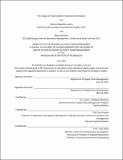The Impact of Trade Credits in Nanostore Distribution
Author(s)
Mogollon Linares, Marcos; Stimpson, Blake
DownloadSupply Chain Management capstone research project (724.2Kb)
Terms of use
Metadata
Show full item recordAbstract
In developing countries, small mom-and-pop grocery stores called nanostores are one of the main grocery market channels. Cash constraints are a severe issue that affects these small businesses, preventing them from buying enough inventory to meet client demand, and forcing them to reject orders from suppliers due to a lack of cash to pay the supplier on delivery. These cash constraints also impose challenges for the suppliers of these stores, by extending the duration of individual visits to nanostores as a result of cash handling, increasing product rejections and reducing the service level consumers experience. Our research explores the effects of relieving these cash constraints via trade credits, using historical data from the sponsor company and a variety of econometric techniques. Our analysis indicates that a supplier trade credit policy, where nanostores are granted short-term deferral for product payments, can significantly boost revenue and generate logistics cost savings. As a result, the return on investment of this policy is positive as early as the first month of implementation. In addition to the clear benefits for the business, this policy can help the traditional nanostore grocery channel remain competitive in developing countries.
Date issued
2021-06-16Keywords
Supply Chain Strategy, Sustainability, Urban Logistics
Collections
The following license files are associated with this item: